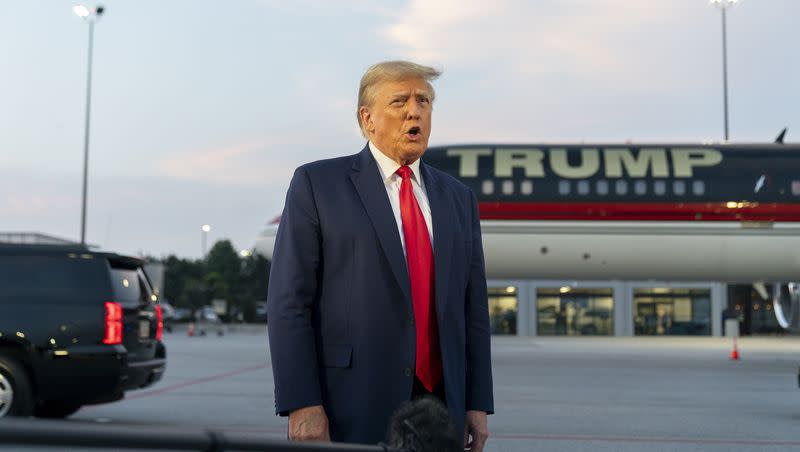Trump waives arraignment and pleads not guilty in Georgia election case. Here’s what’s next

- Oops!Something went wrong.Please try again later.
A new court filing details that former President Donald Trump pleaded not guilty Thursday in the Fulton County election interference case.
Here are the details you need to know:
Trump will “skip arraignment in Georgia,” according to Axios.
According to the court document Trump said, “Understanding my rights, I do hereby freely and voluntarily waive my right to be present at my arraignment on the indictment and my right to have it read to me in open court.”
The New York Times reported that the details are “unclear” as to “where or when” Trump will go to trial for this case.
CNN reported this is the “fourth time that Trump has pleaded not guilty to criminal charges since leaving the presidency.”
Related
How did Trump waive his arraignment appearance? The Associated Press reported that the arraignment hearings set to take place on Sept. 6 “for Trump and the 18 others charged in the case,” by Fulton County Superior Court Judge Scott McAfee, were waived when Trump entered a not guilty plea.
Trump reportedly requested that the judge “separate his case from those of defendants who have asked for an expedited trial” to which attorney Steve Sadow responded in a court filing that this would, “violate President Trump’s federal and state constitutional rights to a fair trial and due process of law.”
What does it mean to waive an arraignment? Because of the plea, Trump doesn’t need to come to court to answer for a criminal charge.
Diario AS reported that, “this occurs early in the legal process, following an arrest and booking. During the arraignment, the defendant is brought before a court, informed of the charges against them, and asked to enter a plea.”
Due to the “public interest” of this case, the plea was filed earlier than in a typical case with less public interest.
What’s next in the Georgia election case? CBS News reported that Fani T. Willis, the prosecutor who brought the case. proposed that the trial for the 19 defendants should take place on March 4, 2024.
Fulton County Superior Court judge, Scott McAfee reportedly approved the date of Oct. 23 this year for one of the charged defendants, Kenneth “Chesebro only,” saying that “the accelerated timeline for the trial and pretrial proceedings ‘do(es) not apply to any co-defendant.”
Related
Can Kemp pardon Trump? The Times reported that the plea was given right as Republican Gov. Brian Kemp of Georgia “dismissed demands from the former president and some of his supporters to start impeachment proceedings against Fani T. Willis, the prosecutor who brought the case.”
As for why Kemp is staying out of the trial he said, “In Georgia, we will not be engaging in political theater that only inflames the emotions of the moment.”
Kemp continued his statement in a conference at the state Capitol when he said, “We will do what is right, we will uphold our oath as public servants, and it’s my belief that our state will be better off for it.”

